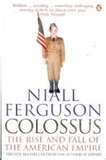
Provocative.
Let’s be honest. To an Irishman, the word “Empire” is up there with “Paedophile”. We’re genetically hardwired to rail up against imperialism, and don’t even get us started on the British Empire unless you want a load of smashed Guinness bottles and broken pub furniture. It was with this mindset that I approched Niall Ferguson’s 2004 bestseller “Colossus: The rise and fall of the American Empire”.
Ferguson is Scottish, a Harvard professor and had given the left a good sandpapering with his previous (And very readable) book “Empire”, where he sets out the case that the British Empire did more good than harm. So it’s fair to say that he has a firm opinion on the issue, and isn’t afraid to show it.
“Colossus” sets out a certain argument, which is this:
” Unlike the majority of European writers who have written on this subject, I am fundamentally in favour of Empire. Indeed, I believe that empire is more necessary in the 21st century than ever before.”
Put that in your pipe and smoke it! Actually, Ferguson isn’t some sort of old Tory golf club bore harking back to an imaginary golden age. Instead, he makes a compelling case that in a world where our technology allows for disease and terrorism to travel rapidly, many of the old systems of sovreign states just cannot respond adequately to these threats. He points out that the mismanagement of one country can effect another, maybe even geographically distant (Afghanistan as an Al Quaeda staging post for 9/11, for example.) and that the rest of the responsible global community has a right to act both in its own defence but also the defence of the people in those failed or rogue states.
” What is required is an agency capable of intervening in the affairs of such states (Where the writ of the International Community does not run.) to contain epidemics, depose tyrants, end local wars and eradicate terrorist organisations.” Sounds like a job for Jack Bauer, if you ask me.
One of his core points is that the standard argument of the left, that this is all about building a neocon run American Empire is not actually true. Ferguson, who has advised John McCain on foriegn policy, regards this as a great failure in that if America was willing to take up that role, and be willing to pay the “Blood and treasure” to stay in Iraq and Afghanistan and other places for 100 years or however long it took them to bring them around to western liberal values, the world would be a better place. Sadly, in his view, ordinary Americans, contrary to what the rest of the world thinks, absolutely balk at the idea of running the planet.
It’s a book guarnteed to start a fight at a respectable liberal dinner party, but is thoughtfully put together and well worth the read.

